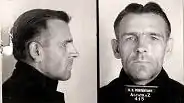Bernard Coy
Bernard Paul "Barney" Coy (February 13, 1900[1] – May 4, 1946) was an American bank robber and federal prisoner best known as the planner of a failed escape attempt from Alcatraz, on May 2, 1946, which turned into a bloody two-day armed confrontation leaving Coy, two fellow would-be escapees and two prison guards dead.[2]
Bernard Coy | |
|---|---|
 Bernard Coy mug shots, 1937 | |
| Born | Bernard Paul Coy February 13, 1900 |
| Died | May 4, 1946 (aged 46) |
| Resting place | Woodlawn Memorial Park Cemetery |
| Criminal status | Deceased (Killed during escape attempt) |
| Conviction(s) | Bank robbery, Kentucky |
| Criminal penalty | 25 years imprisonment |
Coy was a native of Kentucky who turned to crime during the Great Depression and, in 1937, was sentenced to 25 years' imprisonment for committing a robbery with a sawed-off shotgun.[2] He was transferred to Alcatraz from Atlanta in 1938 and was later given the position of cell-house orderly which allowed him access through most of the main cell block on Alcatraz. This relative freedom allowed him to spot a tiny flaw in one of the prison's security features, the bars of the gun gallery overlooking the cell house. Coy along with Joe Cretzer, Marvin Hubbard, Sam Shockley, Miran Thompson, and Clarence Carnes[3] planned to break into the gun galleries to steal weapons, take hostages and then flee to the dock.
Coy was successful in creating a makeshift bar-spreader devised from toilet fixtures in the prison workshops which he hid in a cloth bag inside his mouth. This device enabled him to create a gap of approximately ten inches between the relatively weak bars that protected the gun galleries, then enter and overpower the unsuspecting guard on his return from investigating a fabricated incident caused by Shockley in the prison's secure unit, D-Block. The guard was quickly overpowered and strangled into unconsciousness. Coy then lowered numerous weapons to his fellow conspirators, then took the keys from the guard which provided access to the recreation yard.[4]
The prisoners now had one Springfield rifle, one .45-caliber semi-automatic handgun, and a club, but the most important item supposed to be held in the cage was the key to the yard door of the prison from which the convicts expected to make their way to the island's dock to seize the prison's boat. However, Bill Miller, one of the nine guards held hostage in two cells had, contrary to regulations, held on to the yard door key to let out kitchen staff without having to disturb the gallery guard at lunch instead of returning it to the gun gallery. The escape attempt was thus foiled inadvertently as although the prisoners eventually found the key following a search of the captive guards and cells,[5] the door would not open because it had been jammed by trying the lock with different keys, as it was designed to do.
The escapees held several guards hostage and as there was no hope of negotiating, the struggle between prison authorities and the group of prisoners turned into a violent stand-off, that became known as the Battle of Alcatraz or "Alcatraz Blastout".[6] After two days, prison guards regained control of the prison and the body of Coy was found in a utility corridor along with those of Cretzer and Hubbard.[7]
References
- ancestry.com
- "Golden Gate. The Rock: A History of Alcatraz Island 1847-1972" (PDF). May 31, 1979. Retrieved July 18, 2021.
- "Escapees from Alcatraz: The List of Casualties". January 1, 2010. Retrieved July 18, 2021.
- McCavour 2018, p. 108.
- "Federal Bureau of Prisons: William A. Miller". bop.gov. January 2, 2012. Retrieved July 18, 2021.
- "Crime: Revolt on the Rock". Time. May 13, 1946. Retrieved July 18, 2021.
- Ward 2010, p. 238.
Cited works and further reading
External links
- Contemporary Pathé News newsreel pertaining to the Battle of Alcatraz
- 2021 San Francisco Chronicle news article focusing upon the Battle of Alcatraz
- Alcatrazhistory.com webpage
- Alcatraz Origins at bop.gov